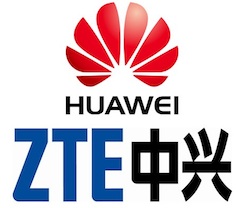WASHINGTON – Chinese tech giant Huawei on Monday called a congressional report warning of security risks from its telecom equipment “an exercise in China-bashing” as US lawmakers held firm to their allegations.

A US spokesman for Huawei said the report by the House Intelligence Committee, which warned of national security risks from equipment from Huawei and fellow Chinese firm ZTE, was “utterly lacking in substance.”
“Huawei unequivocally denies the allegations in the report,” the spokesman, William Plummer, told reporters on a conference call.
Plummer said Huawei requested the congressional investigation a year ago in an effort to clear the air and help provide a better understanding of how the telecom equipment industry shares a “global supply chain” that may lead to security vulnerabilities.
“The report utterly ignores these facts and dismisses 10 months of open information sharing,” he said.
Related: Huawei Responds to Allegations it Poses Security Threat to US
“This report is little more than an exercise in China-bashing and misguided protectionism.”
Plummer said that if the committee’s recommendations to block access to contracts and acquisitions for Huawei and ZTE are carried out, “it would set a monstrous market distorting precedent which could be used against American companies doing business overseas.”
And because rival vendors based in the US and Europe use much of the same components, he said the idea of blocking a single company to improve cybersecurity is “at best naive.”
The comments came as Beijing reacted to the report by urging Washington to “set aside prejudices” and “do things that will benefit China-US economic cooperation instead of the contrary.”
But US lawmakers, who officially released the report on Monday, remained adamant about the potential risks cited in the document.
“We have to be certain that Chinese telecommunication companies working in the United States can be trusted with access to our critical infrastructure,” said committee chairman Mike Rogers.
“Any bug, beacon or backdoor put into our critical systems could allow for a catastrophic and devastating domino effect of failures throughout our networks. As this report shows, we have serious concerns about Huawei and ZTE, and their connection to the communist government of China.”
Rogers said China “is known to be the major perpetrator of cyber espionage, and Huawei and ZTE failed to alleviate serious concerns throughout this important investigation. American businesses should use other vendors.”
Related: Convenient Scapegoat – Why All Cyber Attacks Originate in China
Representative Dutch Ruppersberger, the ranking Democrat on the panel, echoed those comments, saying, “It is our responsibility on the Intelligence Committee to protect our country’s national security…. As this report shows, we have serious concerns about Huawei and ZTE.”
Separately, Representative Frank Wolf said the report “confirms what many have suspected for years: Huawei and ZTE’s relationship with the Chinese People’s Liberation Army is too opaque to allow them to command and control US telecom networks.”
Wolf added that “it would be unwise for any American company or government agency to use Huawei or ZTE products” and urged American firms currently using these products to “quickly divest” of the assets.
Both Huawei and ZTE have repeatedly denied any ties with the Chinese government.
ZTE, in a statement published by China’s Xinhua news agency, said its equipment is “safe.”
“ZTE is China’s most independent, transparent, globally focused publicly traded company,” the statement added.
The committee report said the two firms “cannot be trusted” to be free of influence from Beijing and could be used to undermine US security.
The panel launched its probe over concerns that China could use the fast-growing firms for economic or military espionage, or cyber attacks.
“Based on available classified and unclassified information, Huawei and ZTE cannot be trusted to be free of foreign state influence and thus pose a security threat to the United States and to our systems,” the document said.














